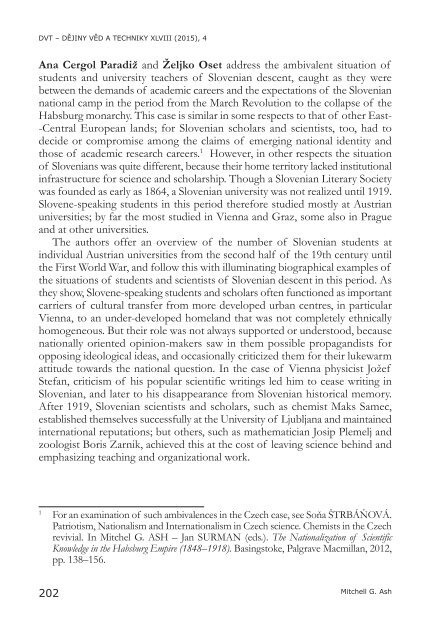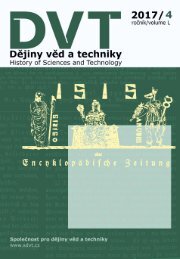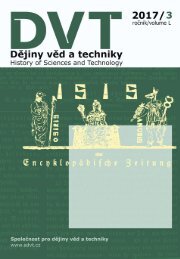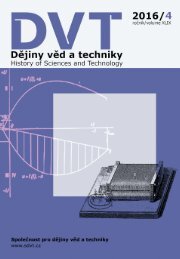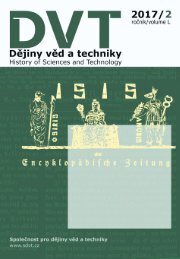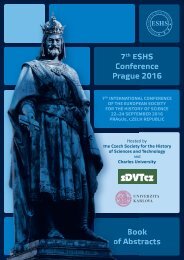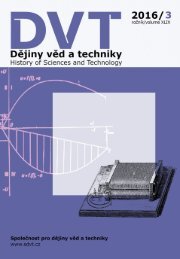Dějiny věd a techniky 2015, 4
Číslo je věnováno 7. mezinárodní konferenci Evropské společnosti pro dějiny vědy, která se konala 22.–24. září 2016 v Praze.
Číslo je věnováno 7. mezinárodní konferenci Evropské společnosti pro dějiny vědy, která se konala 22.–24. září 2016 v Praze.
You also want an ePaper? Increase the reach of your titles
YUMPU automatically turns print PDFs into web optimized ePapers that Google loves.
DVT – DĚJINY VĚD A TECHNIKY XLVIII (<strong>2015</strong>), 4<br />
Ana Cergol Paradiž and Željko Oset address the ambivalent situation of<br />
students and university teachers of Slovenian descent, caught as they were<br />
between the demands of academic careers and the expectations of the Slovenian<br />
national camp in the period from the March Revolution to the collapse of the<br />
Habsburg monarchy. This case is similar in some respects to that of other East-<br />
-Central European lands; for Slovenian scholars and scientists, too, had to<br />
decide or compromise among the claims of emerging national identity and<br />
those of academic research careers. However, in other respects the situation<br />
of Slovenians was quite different, because their home territory lacked institutional<br />
infrastructure for science and scholarship. Though a Slovenian Literary Society<br />
was founded as early as 1864, a Slovenian university was not realized until 1919.<br />
Slovene-speaking students in this period therefore studied mostly at Austrian<br />
universities; by far the most studied in Vienna and Graz, some also in Prague<br />
and at other universities.<br />
The authors offer an overview of the number of Slovenian students at<br />
individual Austrian universities from the second half of the 19th century until<br />
the First World War, and follow this with illuminating biographical examples of<br />
the situations of students and scientists of Slovenian descent in this period. As<br />
they show, Slovene-speaking students and scholars often functioned as important<br />
carriers of cultural transfer from more developed urban centres, in particular<br />
Vienna, to an under-developed homeland that was not completely ethnically<br />
homogeneous. But their role was not always supported or understood, because<br />
nationally oriented opinion-makers saw in them possible propagandists for<br />
opposing ideological ideas, and occasionally criticized them for their lukewarm<br />
attitude towards the national question. In the case of Vienna physicist Jožef<br />
Stefan, criticism of his popular scientific writings led him to cease writing in<br />
Slovenian, and later to his disappearance from Slovenian historical memory.<br />
After 1919, Slovenian scientists and scholars, such as chemist Maks Samec,<br />
established themselves successfully at the University of Ljubljana and maintained<br />
international reputations; but others, such as mathematician Josip Plemelj and<br />
zoologist Boris Zarnik, achieved this at the cost of leaving science behind and<br />
emphasizing teaching and organizational work.<br />
<br />
For an examination of such ambivalences in the Czech case, see Soňa Štrbáňová.<br />
Patriotism, Nationalism and Internationalism in Czech science. Chemists in the Czech<br />
revivial. In Mitchel G. Ash – Jan Surman (eds.). The Nationalization of Scientific<br />
Knowledge in the Habsburg Empire (1848–1918). Basingstoke, Palgrave Macmillan, 2012,<br />
pp. 138–156.<br />
202<br />
Mitchell G. Ash


